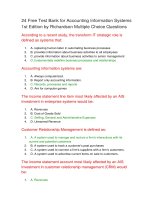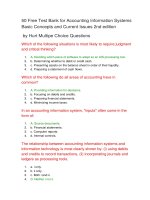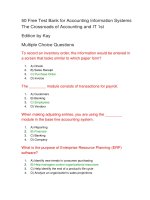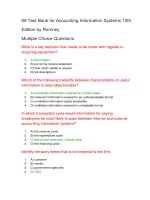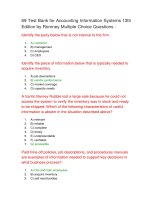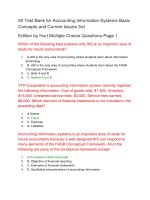50 free test bank for accounting information systems basic concepts and current issues 2nd edition
Bạn đang xem bản rút gọn của tài liệu. Xem và tải ngay bản đầy đủ của tài liệu tại đây (69.26 KB, 12 trang )
50 Free Test Bank for Accounting Information Systems
Basic Concepts and Current Issues 2nd edition
by Hurt Multipe Choice Questions
Which of the following situations is most likely to require judgment
and critical thinking?
1.
A. Deciding which piece of software to adopt as an AIS processing tool.
2.
b. Determining whether to debit or credit cash.
3.
c. Presenting assets on the balance sheet in order of their liquidity.
4.
d. Preparing a statement of cash flows.
Which of the following do all areas of accounting have in
common?
1.
A. Providing information for decisions.
2.
b. Focusing on debits and credits.
3.
c. Preparing financial statements.
4.
d. Minimizing income taxes.
In an accounting information system, "inputs" often come in the
form of:
1.
A. Source documents.
2.
b. Financial statements.
3.
c. Computer reports.
4.
d. Internal controls.
The relationship between accounting information systems and
information technology is most clearly shown by: (i) using debits
and credits to record transactions, (ii) incorporating journals and
ledgers as processing tools.
1.
a. i only.
2.
b. ii only.
3.
c. Both i and ii.
4.
D. Neither i nor ii.
Accounting information systems:
1.
a. Emphasize that the areas of accounting (financial, tax and so on) are
separate and unrelated.
2.
b. Focus on problems that have deterministic answers.
3.
C. Is an important foundation for the study of auditing.
4.
d. Is the most important area of accounting study.
Which of the following are parts of most accounting information
systems?
1.
a. Activities and documents only.
2.
b. Activities and technology only.
3.
c. Documents and technology only.
4.
D. Activities, documents and technology.
Accounting information systems typically incorporate which of the
following: (i) inputs, (ii) outputs, (iii) storage.
1.
a. i and ii only.
2.
b. ii and iii only.
3.
c. i and iii only.
4.
D. i, ii, and iii.
Accounting information systems incorporate interrelated activities
such as:
1.
a. Debiting and crediting accounts.
2.
b. Developing and solving problems with one right answer.
3.
C. Buying and selling inventory.
4.
d. Suggesting new elements and new levels for the conceptual framework.
Which of the following best demonstrates the relationship
between accounting information systems and other areas of
accounting?
1.
a. Tax accountants have to create budgets.
2.
b. Auditors often prepare tax returns for their clients.
3.
C. Virtually all areas of accounting involve inputs, processes, outputs,
storage and internal controls.
4.
d. Accounting information systems is the most important area of
accounting.
Which of the following statements about accounting information
systems is most true?
1.
A. They transform data into information.
2.
b. They transform information into data.
3.
c. They transform data into decisions.
4.
d. They transform information into decisions.
Problems in accounting information systems are often less likely
to have deterministic answers than problems in other areas of
accounting. Which of the following questions has a deterministic
answer?
1.
a. Should AIS documents be paper or electronic?
2.
B. What is the balance in cash as of August 19, 2006?
3.
c. What are the costs and benefits of using information technology in the
AIS?
4.
d. At what point does an amount become "material" as the term is defined
in the conceptual framework?
_____ in an accounting information system helps promote _____
in the financial statements.
1.
a. Documents, accuracy.
2.
B. Internal controls, reliability.
3.
c. Information technology, matching.
4.
d. Data, relevance.
Which of the following is NOT an example of an input to the
accounting information system?
1.
a. Sales invoice.
2.
b. Purchase order.
3.
c. Customer check.
4.
D. Balance sheet.
According to the text, information about accounting information
systems on the Internet falls into ___ main groups.
1.
a. Two.
2.
B. Three.
3.
c. Four.
4.
d. Five.
Accounting information systems are designed to:
1.
a. Minimize cost.
2.
b. Maximize use of information technology.
3.
C. Report information to decision makers.
4.
d. Eliminate the need for paper documents.
AIS study focuses on:
1.
A. Developing critical thinking and judgment skills.
2.
b. Finding the "one right answer" to a problem.
3.
c. Identifying deterministic solutions that can be applied universally.
4.
d. Computers and other forms of information technology.
What type of information involves paying a fee to have it
published on the Internet?
1.
A. Sponsored/commercial.
2.
b. Practitioner.
3.
c. Scholarly.
4.
d. Relevant.
Documents in an accounting information system are:
1.
a. Always paper-based.
2.
b. Always electronic.
3.
C. Either paper-based or electronic.
4.
d. Neither paper-based nor electronic.
Consider the following two statements about accounting
information systems: (i) AIS incorporates more problems with
deterministic solutions than other areas of accounting. (ii) AIS is
more integrative than other areas of accounting. Which of the
statements is/are true?
1.
a. i only.
2.
B. ii only.
3.
c. Both i and ii.
4.
d. Neither i nor ii.
A typical accounting information system comprises ___ parts.
1.
a. Three.
2.
b. Four.
3.
C. Five.
4.
d. Six.
Evaluating information reliability is part of:
1.
a. Information relevance.
2.
b. Information overload.
3.
C. Information literacy.
4.
d. Information transformation.
Accounting information systems involve choices such as: (i)
whether or not to incorporate information technology, (ii) whether
or not to pre-number documents like checks.
1.
A. i only.
2.
b. ii only.
3.
c. Both i and ii.
4.
d. Neither i nor ii.
Outputs from an accounting information system include: (i)
income statements, (ii) tax returns, (iii) decisions.
1.
A. i and ii only.
2.
b. ii and iii only.
3.
c. i and iii only.
4.
d. i, ii and iii.
Both accounting information systems and intermediate accounting
can incorporate the conceptual framework of accounting as a
topic. Which part of the conceptual framework most closely
corresponds with the "outputs" of an accounting information
system?
1.
a. Assumptions.
2.
b. Principles.
3.
c. Constraints.
4.
D. Elements of financial statements.
Which of the following links the study of accounting information
systems with the study of intermediate accounting?
1.
A. Discussion of the FASB Conceptual Framework.
2.
b. An emphasis on finding one right answer to every problem.
3.
c. No need for judgment or decision making.
4.
d. Memorizing the standards for preparing financial statements.
The study of accounting information systems incorporates
knowledge from:
1.
a. Management and finance only.
2.
b. Management and information systems only.
3.
c. Finance and information systems only.
4.
D. Management, finance and information systems.
50 Free Test Bank for Accounting Information Systems
Basic Concepts and Current Issues 2nd edition by Hurt
Multipe Choice Questions - Page 2
Internal controls such as ____ help promote information reliability
in the accounting information system.
1.
a. Financial statements.
2.
B. Bank reconciliations.
3.
c. Budgets.
4.
d. Computers.
"Coverage" is one basis for evaluating Internet information in the
list developed by the University of Maryland. Which of the
following statements on a web site would cause you to question
its coverage?
1.
a. This web site was last updated on August 19, 2006
2.
b. Contact Bumble Beasley if you need a consultant on this topic.
3.
C. This web site is a work in progress.
4.
d. The content of this site is sponsored by XYZ Corporation.
Internal controls in an accounting information system help
promote information integrity. Which of the following best explains
the concept of information integrity?
1.
2.
3.
4.
a. Financial statements are subject to audit.
b. Users can rely on the financial statements as the sole basis for
decisions.
C. The information in AIS outputs is reliable.
d. Accounting information systems that incorporate computer software are
more reliable than paper-based systems.
Studying accounting information systems is important because it
helps future accountants develop critical thinking skills and
professional judgment. Which of the following situations involves
the use of professional judgment: (i) developing sales budgets, (ii)
printing financial statements from a computer program, (iii)
evaluating internal controls.
1.
a. i and ii only.
2.
b. ii and iii only.
3.
C. i and iii only.
4.
d. i, ii and iii.
A well-designed accounting information system recognizes and
adapts to the cost-benefit constraint of the conceptual framework.
Which of the following is most likely to violate the cost-benefit
constraint?
1.
A. Translating financial statements into six major global languages.
2.
b. Giving every member of the accounting staff access to a network.
3.
c. Using debits and credits to record transactions.
4.
d. Converting financial statements prepared in one currency to another
currency.
Which of the following accounting areas involves professional
judgment: (i) accounting information systems, (ii) budgeting, (iii)
choosing between FIFO and LIFO.
1.
a. i and ii only.
2.
b. ii and iii only.
3.
c. i and iii only.
4.
D. i, ii and iii.
Filing the check under the supplier's name is an example of:
1.
a. Input.
2.
b. Processing.
3.
c. Output.
4.
D. Storage.
Recently, Bumble Beasley was researching information published
in 1985. Which of the following topics would he most likely
consider "non-current" in his research?
1.
a. Elements of financial statements.
2.
b. Basic parts of an accounting information system.
3.
C. Computer security techniques.
4.
d. Purpose of accounting.
The cost/benefit constraint mentioned in the FASB conceptual
framework is important in all areas of accounting. Which of the
following is a cost that should be considered in many AIS tasks?
1.
a. Producing financial statements more quickly.
2.
b. Basing decisions on more accurate information.
3.
C. Considering the effects of decisions on human behavior.
4.
d. Memorizing the rules for preparing financial statements.
The inputs mentioned in the preceding scenario are
1.
A. The check and the invoice.
2.
b. The check and the bank reconciliation.
3.
c. The bank reconciliation and the file.
4.
d. The file and the supplier's invoice.
Which of the following statements is/are true when comparing
accounting information systems with basic financial accounting: (i)
problems never have "one right answer," (ii) computers are
essential to both areas.
1.
a. i only.
2.
b. ii only.
3.
c. i and ii.
4.
D. Neither i nor ii.
Which of the following best illustrates why accounting information
systems is an important area of study for future accountants?
1.
a. Making journal entries.
2.
b. Preparing financial statements.
3.
c. Memorizing the rules of debit and credit.
4.
D. Coping with uncertainty.
Which of the following is the best example of "information" as the
term is used in "accounting information systems?"
1.
a. Rules of debit and credit.
2.
B. Budgets.
3.
c. Conceptual framework of accounting.
4.
d. Source documents.
As the term is used in information literacy, "currency" means:
1.
a. Information over one year old should not be used for decisions.
2.
b. Financial information is more important than non-financial information.
3.
C. Decision makers should pay attention to publication dates.
4.
d. Financial statements should be converted to US dollars whenever
possible.
The "information" in an accounting information system should be:
(i) timely, (ii) truthful, (iii) reliable.
1.
a. i and ii only.
2.
b. ii and iii only.
3.
C. i and iii only.
4.
d. i, ii and iii.
The web site for Dell Computers is an example of ___
information.
1.
a. Scholarly.
2.
b. Practitioner.
3.
C. Sponsored/commercial.
4.
d. Accurate.
Which type of information would be most useful in deciding
whether or not to create a wireless network as part of an
accounting information system?
1.
a. Scholarly.
2.
B. Practitioner.
3.
c. Sponsored/commercial.
4.
d. Cultural.
In the preceding scenario, ___ was both an input and an output.
1.
A. The invoice.
2.
b. The supplier's name.
3.
c. The two signatures.
4.
d. Sebastian.
The internal controls mentioned in the preceding scenario are:
1.
a. The dual signatures on the check and the file.
2.
b. The bank reconciliation and the file.
3.
C. The dual signatures on the check and the bank reconciliation.
4.
d. The supplier's invoice and the bank reconciliation.
System outputs in an AIS include the general-purpose financial
statements, variance analysis reports and:
1.
a. Journal entries.
2.
B. Schedules of accounts receivable and accounts payable.
3.
c. Bank statements.
4.
d. More efficient processes.
Which of the following questions is most likely to result in a
deterministic answer?
1.
A. How many units of inventory are on hand as of August 19, 2006?
2.
b. Which inventory items should we continue to sell?
3.
c. Which inventory items should be discontinued next year?
4.
d. What is the expected gross profit for 2007?
Source documents in an accounting information system include
sales invoices, purchase orders and:
1.
A. Bank statements.
2.
b. Reports of projected stock prices.
3.
c. Evaluations of accounting staff.
4.
d. Currency and coin.
Which of the following is a fact about accounting information
systems?
1.
a. They always involve computers.
2.
b. They do not report information unless it can be expressed financially.
3.
c. They provide the most important information for decision making.
4.
D. They involve interrelated parts.
An author's identity and background are most closely related to
which element of information competence?
1.
A. Authority.
2.
b. Accuracy.
3.
c. Objectivity.
4.
d. Coverage.
